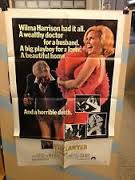
THE LAWYER
US, 1969, 117 minutes, Colour.
Barry Newman, Harold Gould, Kathleen Crowley, Robert Coleburt.
Directed by Sidney J. Furie.
The Lawyer is a courtroom drama that reduces the glamour and clever melodrama of Perry Mason and T.V. courtroom series to a more realistic or more cynical level. There is sordidness in every profession and people with ambitions that, fortunately, generally coincide with good order. This is the atmosphere of
this film of a lawyer.
The film certainly raises many issues - the clash of comic-serious lawyer, Petrocelli, and the southern rich who need his help in their ugly crimes, but who despise him or are jealous of him. The nature of law is explored with some frequently heavy-handed hits at the administration of justice. The crime itself is lurid, and we are shown at least four plausible versions of how it might have been committed, but we never know who did it, for the mystery element is secondary. The film is cleverly made and Barry Newman's Petrocelli is an ambiguous hero. Harold Gould's older lawyer provides the clever legal antics we enjoy in courtroom dramas and he provides them magnificently. The director was Sidney J, Furie, who has made two interesting films of human manipulation. The Ipcress File and The Naked Runner.
1. Did you like this film?
2. Did you like the lawyer - consider his ambitions, Italian background, irresponsible attitudes to traffic laws, caravan way of life, the young people who helped him?
3. What impression of U.S. southern states did the film give - their way of life, luxury and morality, their jealousy and justice?
4. The inquest scene - like a public sideshow, probing privacy in public, what impression did this make? Is this acceptable legal justice?
5. Comment on the techniques of the prosecuting lawyer, his clever psychology/ the bias of the presiding judge, the hostile newspaper publicity, the conduct of the trial.
6. Why did Petrocelli make his appeal - for his client, for justice or for himself? (Consider that he did it against the warning that his career could be in jeopardy if he appealed against a State judge.)
7. What actually happened on the night of the murder?
8. Why the variety of flashbacks? All seemed probable.
9. What impression of lawyers and the conduct of law did the film ultimately give? The nature of law and the judiciary, evidence and testimony, these are impartial and the guilt or innocence of a man rests here, "That's all we have", Petrocelli says. In this case, the law is a good protection. But what about truth, consideration of persons?
10. Did Petrocelli think his client guilty or not? Did he care? Should he have cared? Was Petrocelli the hero of the film?
11. Does it matter that we do not know what happened?
12. Were you satisfied with the impression of the processes of law the film gave you?